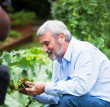Breed: Portuguese Water Dog
Temperament: energetic, loyal
Lifespan: 12-14 years
Recommended for: energetic people
Maintenance: medium – high
What looks like a Poodle, loves water like a Poodle but isn’t a Poodle – a Portuguese Water Dog! But don’t be worried if you mistake one for a Poodle – there’s only a handful in Australia.
Appearance: While frequently mistaken for a Poodle, the Portuguese Water Dog really only has a form of grooming – the lion clip – in common. This is usually maintained on show dogs and has a full coat covering the shoulders, front legs and head, while the back legs, tail and muzzle are closely trimmed. The coat is curly and somewhat like that of the Poodle in that it’s claimed to cause fewer problems for people with allergies to animal fur.
Standing 43-57cm (17-22.5″) high and weighing between 16-25kg (35-55lb), this is a medium-sized dog, which in Australia is black, but in Portugal also comes in shades of brown through to grey and white.
Temperament: Owners of the Australian dogs say they are intelligent and easier to train than many other breeds they’ve experienced. While loyal and affectionate, these dogs do show a degree of stubbornness. Texts suggest the Portuguese Water Dog has great stamina, which could be exhausting for some prospective owners.
Health: The Australian importers say hereditary diseases such as hip dysplasia and eye problems are known overseas and every effort has been made to secure dogs which have been tested clear of these. An important step forward has been DNA testing to identify the genes carrying these diseases, and excluding carrier dogs from breeding programs. Other problems noted overseas include Addison’s disease and heart disease.
Breeding: Australian breeders intend to import semen to begin their breeding program, then mate offspring back to their male dog. Overseas, Portuguese Water Dogs usually have four to eight puppies and, reportedly, no whelping problems.
Costs: The dogs are expected to sell for about $1200, but there are none available until late 1999. It cost $10,000 to import one of the Portuguese Water Dogs into Australia.
Housepet potential: The coat sheds little hair and is said to be good for people with allergies.
Space & exercise: This is a breed with great stamina and owners recommend a daily walk of 20-30 minutes. Not surprisingly, they enjoy swimming.
Grooming: Regular grooming is essential as the coat doesn’t shed and needs to be brushed thoroughly several times a week to prevent matting and tangling. Show dogs need clipping fortnightly, and each week every dog’s ears must be cleaned – especially after swimming – to prevent disease. Pets may be trimmed uniformly, and most owners are able to maintain this style. Once wet, the coat can take some time to dry.
Trainability: Australian owners say the Portuguese Water Dog is easier to train than other breeds they’ve dealt with, although they can be stubborn. Texts including Coren’s “Intelligence of Dogs” rates them as above average working dogs.
Ideal owner: This is a dog for people who have sufficient time and dedication to a regular grooming and exercise routine, as neglecting either will have consequences for the dog’s wellbeing. A commitment to training is essential.
Popularity: There are only 12 Portuguese Water Dogs known in Australia, and while others interviewed by Burke’s Backyard have shown interest in the breed, Australian owners doubt it will ever be really popular. Due to advances in marine technology, the breed almost died out earlier this century, with only a handful being bred by enthusiasts.
History: In Portugal the dog is called Cao de Agua (pronounced Kown-d’ahgwa), or ‘dog of the water’, and is also known as the Portuguese Fishing Dog, Diving Dog or the Sea Dog. This refers to their use in past centuries by fishermen to guard their boats and the catch. It’s also suggested they would dive and retrieve escaping fish in water, as well as carry messages between fishing boats at sea, but in modern times the dog is primarily a companion animal.
National contacts
To find up-to-date contacts for breeders, contact the following organisations.
Dogs NSW
http://www.dogsnsw.org.au/breeders-directory
Email: [email protected]
Phone: 1300 728 022 (NSW only) or (02) 9834 3022
Fax: (02) 9834 3872
Dogs Victoria
http://www.vca.org.au
Email: [email protected]
Phone: (03) 9788 2500
Fax: (03) 9788 2599
Dogs ACT
http://www.actca.asn.au
Email: [email protected]
Phone: (02) 6241 4404 – Fax: (02) 6241 1129.
Dogs West
http://www.cawa.asn.au
Email: [email protected]
Phone: (08) 9455 1188
Fax: (08) 9455 1190
Dogs SA
http://dogssa.com.au
Phone: (08) 8349 4797
Canine Control Council of Queensland
http://www.cccq.org.au
Email: [email protected]
Phone: (07) 3252 2661
Fax: (07) 3252 3864
Tasmanian Canine Association
http://www.tasdogs.com
Email: [email protected]
Phone: (03) 6272 9443
Fax: (03) 6273 0844
Dogs NT
http://www.territorydogworld.com
Email: [email protected]
Phone: (08) 8984 3570
Fax: (08) 8984 3409



